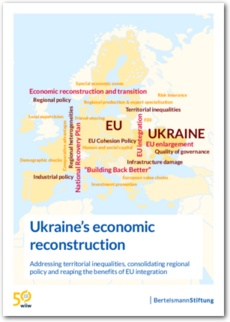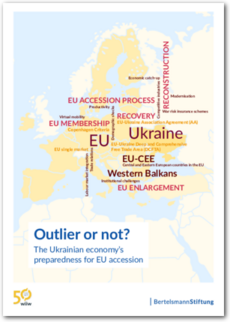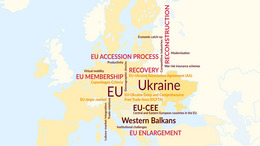The result: Ukraine, like the eleven countries that joined the EU during the 2004 to 2013 enlargement, could be successfully integrated. Bertelsmann Stiftung and the Vienna Institute for International Economic Studies (wiiw) in two new studies provide neutral and detailed analyses of Ukraine's economic potential and the regional differences within Europe’s second-largest country that has been an EU accession candidate since June 2022.
Viktor Orbán claims for Ukraine to be too large, too poor, and not yet ready for the EU. This is countered by three key findings of the study Outlier or not? The Ukrainian economy's preparedness for EU accession:
Ukraine is not an outlier. In terms of economic size, Ukraine resembles Hungary or Romania, as a share of the EU economy at the time of their accession. Relative to the EU, Ukraine is comparable in terms of wealth with Latvia, Lithuania and Romania when they submitted their membership applications. If Ukraine were to join the EU today, it would increase the bloc's GDP by around 1 percent and its population by around 9 percent, similar to Poland's impact in 2004.
Ukraine is not poorer or less capable than previous EU candidates. The economic performance of Ukraine is comparable to that of the Central and Eastern European EU member states at the time of their accession applications or admission to the EU. These potentials have not been completely lost with the war. Before the Russian large-scale invasion, Ukraine’s real GDP grew more strongly than that of the EU in 2000-2008, 2010-2013 and 2016-2019. "This suggests Ukraine is capable of strong catch-up growth with the EU when the war ends in a similar way as most of the previous joiners between 2004 and 2013, just with the green and digital transformation at the center of the Ukrainian catch-up process", says Richard Grieveson, co-author of the study and deputy director of wiiw.
The institutional standards of Ukraine are comparable to those of Bulgaria and Romania when they applied to join the EU in the 1990s. Based on the pace of reform of previous EU joiners, Ukraine will be institutionally ready for EU accession in about 10 years. Meanwhile, Ukraine’s strong civil society and independent expert community continue to foster reforms even during the war. Likewise, the EU partners of Ukraine have learned from experience, such as optimising the use of conditionality.
The Russian invasion that began in February 2022 has further intensified the regional reorientation of the Ukrainian economy since 2014 and affected individual industries to varying degrees. The study Ukraine's economic reconstruction. Addressing territorial inequalities, consolidating regional policy and reaping the benefits of EU integration explores the regional industrial structures, the potential for specialisations and growth, as well as weaknesses, in order to identify measures for Ukraine's economic development.
Modernisation and transformation of the Ukrainian economy require targeted industrial and regional policies:
For reconstruction and economic catch-up, it will be crucial that support is focused and accompanied by structural reforms so that the identified regional innovation and growth potentials can be quickly utilised. Administrative capacity based on good governance and proper administrative processes must be given particular attention. Above a certain investment threshold, governance will be a determining factor for the effective absorption of funds and economic development.
For the foreseeable future, the east and south of Ukraine will be more dependent on public investments and transfer payments. Western regions of Ukraine have the potential to attract capital from private domestic and international investors, while the eastern and front-line regions risk falling into a poverty trap.
The EU should use its economic and financial impact to develop comparative advantages and create the conditions for integrating Ukraine into European value chains. In doing so, it can draw on experiences from EU Cohesion Policy to steer reconstruction towards an economically diversified and territorially balanced growth path that takes into account regional potentials and weaknesses. The Ukrainian National Recovery Plan and the policy objectives of EU Cohesion Policy are in many ways comparable.
Ukraine’s accession process: a catalyst and framework for reform
Ukraine must overcome old weaknesses, comprehensively reform its institutions and attract foreign direct investment in order to be able to compete in the EU internal market in the long term. At the same time, the political decision-makers of the EU member states must be willing to give preference to a (sustainable) EU perspective over (backward-looking) national interests, reject protectionist reflexes and raise the potential available in Ukraine.
Considering the political Copenhagen Criteria, the existential struggle of the Ukrainians for their EU perspective must be acknowledged. As for institutional reforms, it must be clarified that the current summit will decide on the start of the negotiation process, but not on the immediate accession of Ukraine. "The process should be used to gradually bring Ukraine closer to EU membership. Concrete goals and a realistic timeframe need to be communicated. If we take the reform pace of previous accession countries as a benchmark, Ukraine could be institutionally ready for EU accession in ten years", clarifies Miriam Kosmehl, Senior Expert at the Bertelsmann Foundation and co-author of the studies. "A reliable accession perspective will support the reform-oriented Ukrainian forces in political negotiation processes."
![[Translate to English:] Die Flaggen der Ukraine und der Europäischen Union flattern im Wind am blauen Himmel](/fileadmin/files/_processed_/5/b/csm_AdobeStock_504331922_KONZERN_ST-EZ_c7fa0c4efc.jpg)





![[Translate to English:] Weltkarte](/fileadmin/files/_processed_/2/e/csm_AdobeStock_143550481_KONZERN_ST-EZ_ID-1729_Titel_Interconnectivity_2023_02_535bd86918.jpg)



